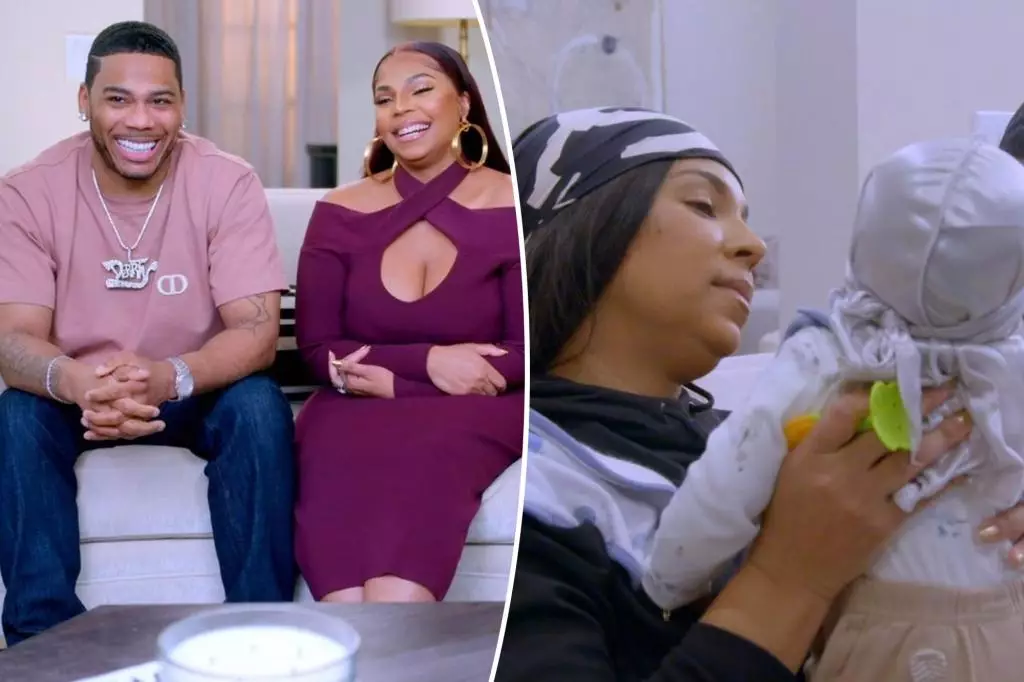In the world of celebrity, parenting is often scrutinized through a lens clouded with public expectation, privilege, and judgment. Take the recent spotlight on rapper Nelly and singer Ashanti as an example. Their very public navigation of fatherhood and motherhood, especially as displayed on their reality show *Nelly & Ashanti: We Belong Together*, reveals much about modern relationships, gender roles, and parental responsibility amid fame. What might seem like a humorous, casual dismissal of diaper duty actually underscores deeper tensions around traditional and contemporary notions of fatherhood.
Nelly’s Stance on Parenting Duties: Humor or Avoidance?
Nelly’s outright refusal to change diapers, evident in a viral scene from the couple’s Peacock reality show, sparked considerable backlash. The rapper candidly quipped, “I ain’t got nothing for him,” absolving himself from the hands-on care of his infant son, Kareem. While he couches his comments in humor and practicality—claiming the newborn’s needs will shift once the child grows and can express himself—his stance clashes sharply with societal expectations that fathers share the workload equally, especially in such intimate caregiving tasks.
This raises an important question: Is Nelly’s behavior a reflection of genuine generational attitudes toward fatherhood, or does it indicate an underlying reluctance to embrace the messy, often uncomfortable realities of childcare? Dismissing diaper changes may be a trivial matter for some, but for many parents, these moments are foundational to bonding and presence. Nelly’s approach, while arguably honest, risks reinforcing outdated ideas about caregiving being predominantly a mother’s domain.
The Emotional Toll on Ashanti: More Than Just a “Baby Mom”
Ashanti’s visible fatigue and frustrations in the show illuminate the often unseen emotional toll on mothers who bear the bulk of infant care. Her resigned eye-rolls and sighs after Nelly’s remarks speak volumes about how uneven parenting divisions can breed resentment and exhaustion. The label used by social media critics—“married single mom”—though harsh, reflects a genuine cultural critique about gender imbalances in parenting duties.
But reducing Ashanti to a mere caretaker neglects her own agency and partnership in the relationship. She’s not just enduring the hardship; she’s balancing a demanding career and motherhood simultaneously. The complex interplay between her patience and frustration underscores how celebrity parents confront the twin pressures of public performance and private struggles, often without adequate support or recognition.
Financial Support vs. Emotional Involvement
Nelly’s subsequent clarification—that he financially supports their family by hiring nannies—adds another layer to the debate about what it truly means to be present for one’s child. Providing resources is undoubtedly important, but financial backing alone cannot replace hands-on parenting. The reliance on hired help may ease practical burdens but might add emotional distance, particularly in the early, formative months of a child’s life.
This raises a broader societal inquiry into how wealth and privilege shape modern parenting narratives. For celebrities like Nelly, it is comfortably feasible to delegate physical caregiving tasks; yet, does this delegation inadvertently dilute the father-child connection? And how does it frame the expectations of fathers who do not have the means to outsource these responsibilities?
Parenting Roles in Evolving Relationships
Nelly and Ashanti’s relationship itself is notable—rekindled after a decade and culminating in a secret marriage before welcoming their son, Kareem. Their journey challenges conventional timelines and illustrates how personal and professional lives intertwine unpredictably in the spotlight. While their story is uniquely theirs, it also exemplifies broader changes in family structures and expectations.
Their dynamic highlights how parenting is an evolving process, especially in blended families and step-parenting situations. Nelly, with four older children and experiences of loss and adoption, brings a different dimension to fatherhood than a first-time parent might. But instead of emphasizing maturity or growth, the public focus remains on his apparent reluctance to take on certain duties, arguably overshadowing any nuanced progress in their family life.
Public Judgment and the Reality of Parenthood
The intense social media backlash following the clip reflects society’s growing intolerance for perceived parenting shortcomings—especially by fathers. However, this tendency to publicly shame risks oversimplifying deeply personal and complex family dynamics. Celebrity parenting unfolds under public gaze, making private struggles very public and often magnified beyond proportion.
Yet, the narrative around Nelly and Ashanti offers an opportunity to question and expand our understanding of fatherhood’s many forms rather than to simply criticize. Not every father engages with fatherhood identically, and societal flexibility is needed to accommodate diverse approaches without eroding the essential values of involvement, respect, and partnership in parenting.
Ultimately, Nelly and Ashanti’s parenting story is a microcosm of broader cultural conversations—about gender roles, emotional labor, the impact of privilege, and evolving family models. It challenges us to consider what it means to be a “good parent” today beyond the shadows of stigma and stereotype.

